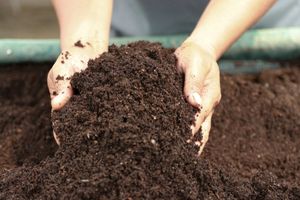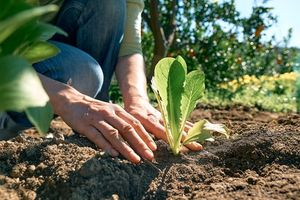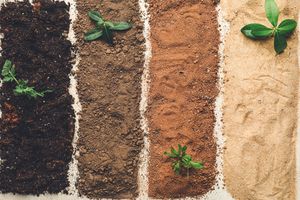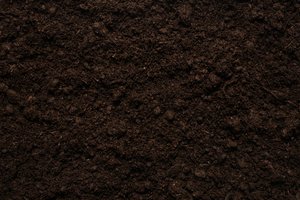Anyone who has ever spent time in a gardening store can attest to the fact that there are many different types of topsoil on the market. As the key ingredient for growing all types of plants, this type of rich soil contains the nutrients that are needed to foster plant growth in the area toward the surface of the ground.

Topsoil generally contains a mixture of clay, silt, sand and manure in a specific ratio suited to its intended purpose, whether it is growing herbs, flowers, trees, vegetables or other types of plants. However, when purchasing topsoil, consumers will also need to decide whether they need unscreened or screened soil.
What Is Screened Soil?
Screened topsoil is soil that has been run through a mesh of a particular size during its manufacturing process. This process removes larger pieces of soil as well as roots, stones and other materials. It is available in different particle sizes, such as 3/4 inch or 5/8 inch. Soil that is screened to 1 inch, for example, will not contain anything that is bigger than an inch in diameter. Half an inch is considered one of the most common sizes of screened topsoil, but a good range of sizes is available to suit different purposes. Finer screening sizes will result in soil with a finer texture, and in many cases, the price of soil goes up as the screening size gets smaller.
To achieve screened topsoil of a particular size, the soil is placed into a large machine that can separate the finer soil particles from bigger pieces of debris like rocks, stones, large plant roots and twigs. It is fed into the machine and then falls on a screen, which will vibrate to loosen the materials and free them from the topsoil. The finest pieces of the topsoil will make their way through the screen, while the debris that remains will be discarded. It will then be packaged and shipped.
It is possible to screen small amounts of topsoil on your own with a mesh screener or soil sifter, but larger quantities are best left to professionals with access to machinery.
Top Uses for Screened Soil

Applying topsoil with a consistent particle size to a garden can make it easier for nutrients and water to flow through the soil naturally and create a healthier growing environment. When it has been tilled into the natural topsoil in a garden, screened topsoil can help a plant’s roots to grow deeper. When it is used for fruit trees and other large plants, it can give them better odds of growing tall and producing plenty of fruit.
Here is a look at some of the top uses for screened soil.
Creating a Base for a Flower Garden
Because screened topsoil is loose and evenly sized, it provides excellent drainage while allowing nutrients to enhance the growth of flowers. It is also suitable for raised flower beds.
Planting a Vegetable Garden
Screened topsoil is fairly soft and can mix well with different types of fertilizers, composts and potting soils, making it the ideal choice for helping a vegetable garden to thrive.
Planting Trees or Shrubs
Good-quality screened topsoil has a great nutrient capacity, which means it can feed trees and shrubs well and allow them to produce more abundantly, while its soil structure is ideal for developing strong roots.
Filling in Lawn Areas
When installing sod, screened topsoil is the best choice because it is very uniform in texture, making it easy to rake and grade smoothly. This allows for a lawn to be installed perfectly flat if desired.
Types of Screened Topsoil

In addition to looking for the correct size to suit the project at hand, it is important to purchase the correct type of soil. Here are some of the most common types of screened topsoil consumers will encounter.
Sandy Topsoil
This is a type of topsoil that contains a high amount of sand, and it is suited to plants that require better drainage than that offered by a loamy topsoil.
Loamy Topsoil
This consists of roughly equal amounts of silt, sand and clay, and it is used for common gardening applications, such as flower and vegetable gardens and planting grass.
Clay Topsoil
This is topsoil that contains more clay than loamy or sandy topsoil, and it is suited to gardens in dry areas that experience frequent drought conditions and limited rainfall.
Choosing High-Quality Topsoil
Not all topsoil is created equally, so it is important to know how to shop for the best quality topsoil to get your garden off to a great start. Here are some considerations to keep in mind when shopping for topsoil.
Texture
Regardless of its size, good-quality topsoil will have a crumbly and loose texture. If a small amount of this soil is rubbed between your fingers, you should feel some grit, which represents the mineral part of the topsoil. Avoid topsoil with large clumps.
Color

Although topsoil that is very dark can be rich and therefore good for planting, soil that is too dark could contain excessive organic matter. Although plants do need some organic matter to thrive, they also need inorganic material in the form of minerals such as potassium, magnesium, calcium, and phosphorus.
Debris
Topsoil should not contain any plant roots, rocks, trash or other foreign material, even if the pieces are within the size specified. High-quality topsoil will be screened thoroughly to ensure that it does not contain extra weeds or roots. This is a major concern if the soil is used to grow plants as virulent weeds can ruin a garden.
pH Levels
In order to grow and thrive, plants need soil that has a pH level of between 5.5 and 7.5. Be sure to ask the dirt supplier about the pH level of the topsoil you are considering and confirm that it falls within an appropriate range for whatever you intend to plant in it.
Get in Touch With Dirt Connections
If you need screened dirt of any size for your gardening projects, get in touch with Dirt Connections. We can deliver a broad range of high-quality soil and dirt types to residential and commercial sites in the Northern Virginia area.
Summary

Dirt Connections was started with one goal in mind: providing quality residential and commercial construction services to clients on time and on budget. Reach out for more information on how we can support your next project.
For your convenience our estimates are free and by appointment. Call 703-940-9949 for a free estimate today!










































